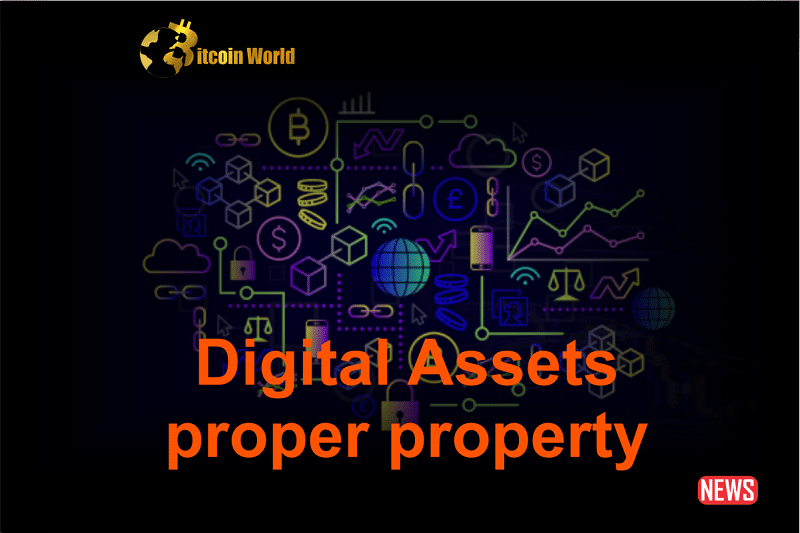Are your digital collectibles just pixels on a screen, or do they hold real-world value? Sebastien Borget, the co-founder of The Sandbox, believes it’s time we recognized the tangible worth of our digital lives. He argues that as more of us live and interact online, cryptocurrencies and non-fungible tokens (NFTs) deserve the same legal standing as traditional property. Let’s dive into why this shift is crucial for the future of the digital economy.
Why Should Digital Assets Be Considered Legal Property?
Borget’s argument stems from the undeniable growth of the ‘digital native’ population – individuals who’ve grown up immersed in technology. Think about it: how much of your life, your connections, and even your spending happens online? Borget highlighted this at Blockchain Week Rome, emphasizing the sheer number of people now living significant portions of their lives in the digital realm.
- The Rise of Digital Natives: With over half the world’s population now considered digital natives, their engagement and investment in digital spaces are significant.
- Real Value, Real Investment: People are spending real money and time acquiring digital assets. Shouldn’t these investments be protected and recognized?
- The Metaverse as a New Frontier: The Metaverse offers new ways to connect, work, and create value. Recognizing digital assets legitimizes these emerging economies.
The Metaverse: More Than Just a Game?
Borget sees the Metaverse as more than just a virtual playground. It’s a potential economic powerhouse where digital natives can thrive. But for this to happen, governments need to catch up. Consider these points:
- Recognizing Digital Work: The Metaverse facilitates new types of jobs and creative endeavors. Governments should acknowledge and value this digital labor.
- The Digital Economy is the Real Economy: The lines between the physical and digital worlds are blurring. Treating the digital economy as a separate entity is no longer practical.
- Fostering Innovation: Legal recognition can encourage further innovation and investment in the digital space.
The Positive Impact of Digital Asset Recognition
Beyond the economic arguments, Borget also points to the potential for positive social impact. Even amidst global challenges, the digital realm can offer solutions and opportunities.
- Breaking Down Barriers: The Metaverse can be a force for inclusivity, offering opportunities to people regardless of their physical location or circumstances.
- Empowering Creators: Lowering the barrier to creating digital content allows more individuals to express themselves and build livelihoods.
- Financial Inclusion: Cryptocurrencies can provide access to financial systems in regions where traditional banking is limited.
The Role of AI in the Digital Revolution
Borget also touched upon the transformative power of Artificial Intelligence (AI) in shaping the digital landscape.
- Accelerating Creativity: AI tools can drastically speed up the idea generation and creation process. What once took days can now be visualized with a simple text prompt.
- Empowering Individuals: AI can be a powerful tool for creators, enabling them to bring their visions to life more efficiently.
- Human Collaboration Remains Key: While AI is a powerful tool, Borget emphasizes that human input and refinement are still crucial for creating high-quality content.
Building a Better Virtual World
Ultimately, Borget envisions a digital world where individuals can find purpose and express their unique talents. This includes providing support for mental well-being within these virtual spaces.
- Finding Your Niche: The virtual world can offer a space for individuals to discover and develop skills that might not be as readily applicable in the physical world.
- Community and Connection: Online platforms can foster strong communities and provide vital social connections.
- The Power of Collective Creation: The Metaverse thrives on user-generated content, creating a dynamic and ever-evolving environment.
Challenges and Considerations
While the benefits are clear, recognizing digital assets as legal property also presents challenges:
| Challenge | Consideration |
|---|---|
| Regulation and Legal Frameworks | Governments need to develop clear and consistent regulations for digital assets. |
| Security and Ownership | Ensuring the security and verifiable ownership of digital assets is crucial. |
| Valuation and Taxation | Establishing fair and transparent methods for valuing and taxing digital assets is necessary. |
Actionable Insights
What does this mean for you?
- Stay Informed: Keep up-to-date with the evolving legal landscape surrounding digital assets.
- Engage in the Digital Economy: Explore the opportunities presented by the Metaverse and digital asset ownership.
- Support Innovation: Advocate for policies that recognize and support the growth of the digital economy.
Conclusion: Embracing the Future of Digital Ownership
Sebastien Borget’s call for the legal recognition of digital assets isn’t just a niche request from the crypto world. It’s a reflection of the fundamental shift in how we live, work, and interact. As our lives become increasingly intertwined with the digital realm, acknowledging the real value and ownership of digital assets is not just logical – it’s essential for building a thriving and equitable future in the Metaverse and beyond. The time to recognize the digital economy as the real economy is now.
Disclaimer: The information provided is not trading advice, Bitcoinworld.co.in holds no liability for any investments made based on the information provided on this page. We strongly recommend independent research and/or consultation with a qualified professional before making any investment decisions.




